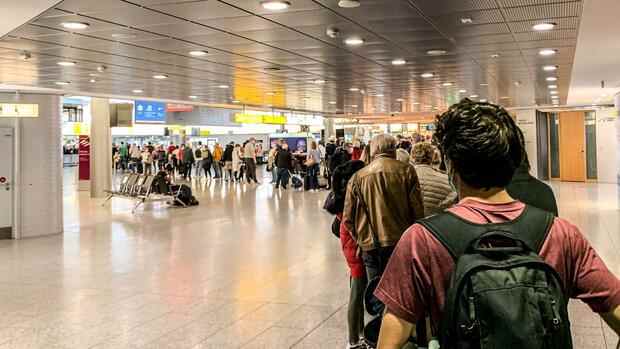Frankfurt Queues up to 300 meters long, waiting times of more than 40 minutes: If you wanted to take off at Düsseldorf or Cologne-Bonn airports last weekend, you needed patience above all. Lack of staff in the security services and the ground service providers caused major problems – again.
Waiting instead of flying seems to be becoming the “New Normal” in aviation towards the end of the pandemic. Whether at security checks, unloading luggage, in catering, with the pilots, in cockpits and cabins – the industry lacks staff everywhere. The programs for job cuts, which were hectically developed in the great need of the corona crisis, are taking revenge. But the poor pay for ground services is also noticeable.
Now that flying is possible again, it’s getting torturous. A week ago, passengers in Hamburg were hit: because many employees had called in sick, according to the federal police, there were major bottlenecks at the security checks. Passengers had to wait up to 90 minutes, some missed their flight.
After consultation with the Frankfurt airport operator Fraport, Lufthansa canceled a three-digit number of flights around Easter as a precaution so that the handling of the jets did not collapse completely. Lufthansa boss Carsten Spohr praises the cooperation with Fraport in this situation, but he is not satisfied. “Of course, that can’t be the solution,” said Spohr last week at Lufthansa’s Annual General Meeting. But for the time being, such cancellations will probably remain part of the solution. “The summer ahead of us will be challenging,” says the airline boss, already preparing customers for further bottlenecks.
Top jobs of the day
Find the best jobs now and
be notified by email.
Airlines and airports cut jobs massively during the crisis to save their stretched balance sheets. Lufthansa alone reduced the workforce by a quarter to just over 100,000 employees. After customers were reluctant to fly at the beginning of the year because of the Omikron variant, demand has risen sharply in recent weeks – more than many aviation managers had expected.
Personnel planning was partly adjusted too late
“Companies increased their personnel capacities too late,” says Gerald Wissel from the aviation consultancy Airborne Consulting. In addition, some companies would still employ some of their employees on short-time work. The federal government has extended the generous and balance sheet-friendly regulation until the end of June.
>> Read about this: Lufthansa boss Spohr wants to reach full capacity before 2025
If the colleagues are brought back, they have to be trained again because of the high security requirements. “That creates a large training backlog,” says Wissel. In addition, there are bottlenecks in the reliability checks, such as those prescribed for ground staff. “The authorities themselves have personnel problems,” explains Wissel.
Then there is the pandemic. Even if the health system is no longer at risk of being overloaded due to the high vaccination rates, those infected still have to be isolated. That exacerbates the need. At the end of April, for example, Lufthansa was only able to offer very limited catering on European flights, as the service provider Gategroup repeatedly had to quarantine staff.
Even if the shortage of staff could be remedied quickly in the best-case scenario, it would probably only help to a limited extent. Because the problem is not purely German. There is a shortage of employees across Europe.
Pilots are already becoming scarce in the US, and that could soon be the case in Europe as well.
(Photo: imago/imagebroker)
The Dutch KLM had to cancel a double-digit number of flights in Amsterdam and Rotterdam at the end of April to avoid a collapse. Easyjet, in turn, is considering reducing the number of seats that can be booked on some flights. The flight can then take off with three instead of four cabin crew members.
British Airways wants to cut five percent of the planned capacity in the important summer business. The airline has already canceled 1,400 flights since the beginning of April. Chaotic situations occur again and again at airports such as Birmingham and Manchester, and passengers sometimes have to wait several hours to be checked in.
Companies are trying hard to find new staff. The Lufthansa subsidiary Eurowings, for example, offers entry bonuses for its expansion in Scandinavia. Until the end of May, the company is offering captains who sign for at least 24 months the equivalent of 10,000 euros. Co-pilots should get half.
In Great Britain, the Ministry of Transport is currently working on a regulation according to which employees with no experience in aviation can get started before the authorities have finally certified their reliability. It would be a novelty.
Acute pilot shortage in the USA
Nevertheless, it should be really tight in the summer. Then the airlines expect a load factor that is no longer far from the pre-crisis level. Stefan Schulte, the head of the airport operator Fraport, has therefore been warning for a long time about longer queues at peak times.
By then at the latest, the staff in the cockpit should also be scarce. Currently, most airlines in Europe can still cushion the demand. Pilots with valid licenses are in constant use. Meanwhile, those pilots who did not fly during the crisis can complete their training.
In the summer, this will no longer work in any case. Many pilots left their companies during the pandemic. At Lufthansa, around 400 pilots took advantage of the severance packages – more than management had expected. Now the “Hansa” wants to stop again.
But that’s not so easy, as a look at the USA shows. There is an acute shortage of pilots there. Thousands retired in the pandemic. Now the airlines are hiring whatever is possible. Lufthansa partner United Airlines alone is looking for 13,000 pilots this year. In a normal year there are a maximum of 5000.
More: Synthetic kerosene – the beacon of hope above the clouds
